
 i_need_contribute
i_need_contribute

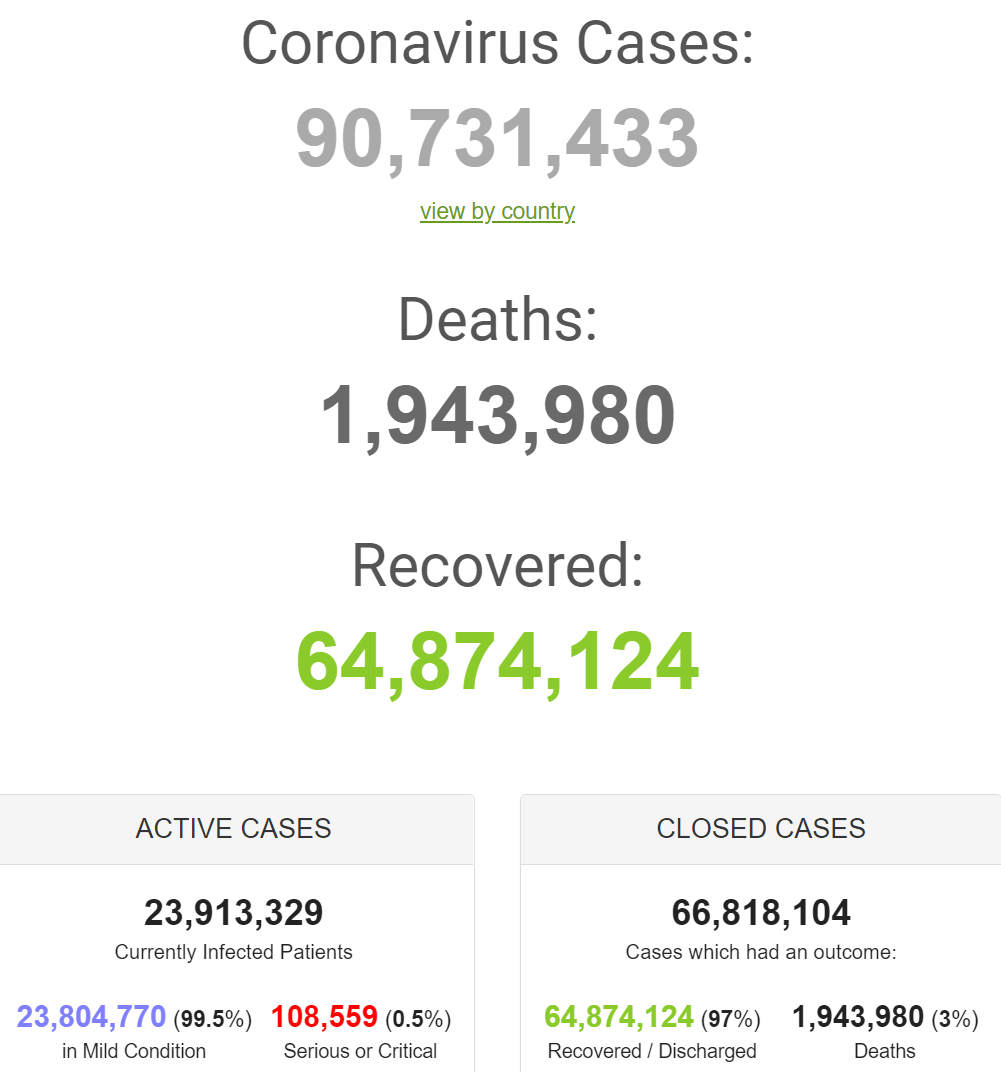
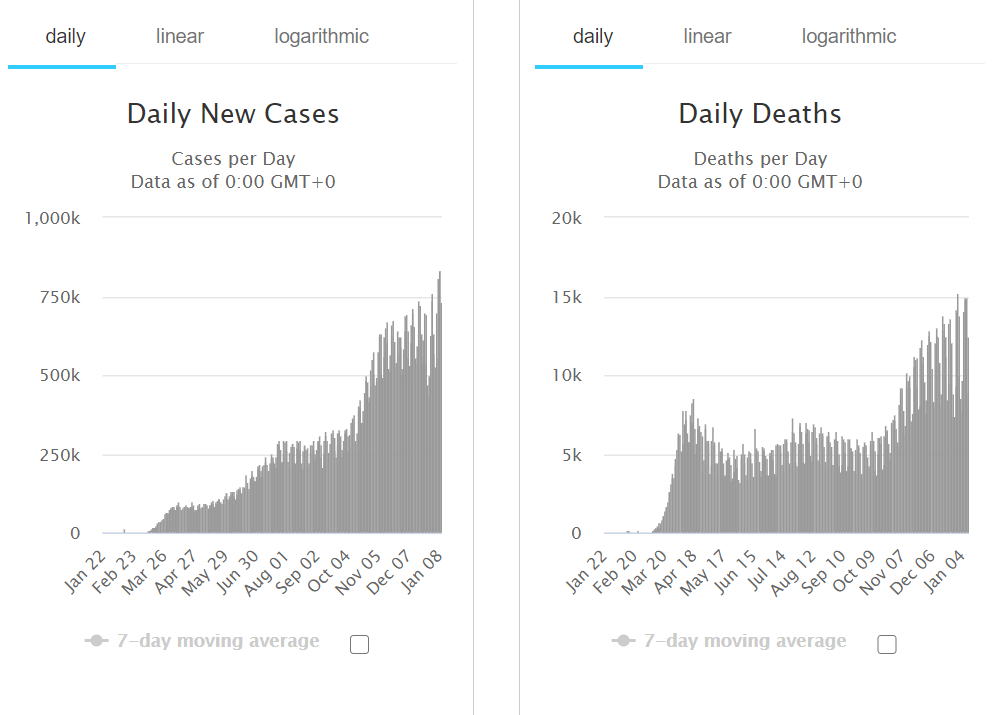
|
Country, |
Total |
New |
Total |
|
World |
90,676,319 |
+612,212 |
1,942,625 |
|
22,917,334 |
+213,453 |
383,275 |
|
|
10,467,431 |
+16,085 |
151,198 |
|
|
8,105,790 |
+29,792 |
203,140 |
|
|
3,401,954 |
+22,851 |
61,837 |
|
|
3,072,349 |
+54,940 |
81,431 |
|
|
2,783,256 |
+15,944 |
67,750 |
|
|
2,326,256 |
+9,138 |
22,807 |
|
|
2,276,491 |
+18,627 |
78,755 |
|
|
2,050,360 |
+25456 |
51,874 |
|
|
1,929,353 |
+14,194 |
41,434 |
|
|
1,786,900 |
+15,537 |
46,114 |
|
|
1,722,217 |
+7,808 |
44,495 |
|
|
1,524,036 |
+16,105 |
133,204 |
|
|
1,385,522 |
+9,410 |
31,189 |
|
|
1,286,406 |
+5,968 |
56,171 |
|
|
1,231,597 |
+17,421 |
33,163 |
|
|
1,115,026 |
+5,011 |
19,767 |
|
|
1,035,184 |
+2,909 |
38,280 |
|
|
872,847 |
+6,612 |
12,361 |
|
|
831,171 |
+8,405 |
13,192 |
|
|
828,026 |
+9,640 |
24,129 |
|
|
671,284 |
+3,082 |
16,654 |
|
|
662,694 |
+1,991 |
20,038 |
|
|
660,289 |
+7,816 |
16,950 |
|
|
641,923 |
+4,181 |
17,096 |
|
|
602,938 |
+607 |
12,895 |
|
|
522,453 |
+1,071 |
7,781 |
|
|
502,416 |
+2,899 |
10,644 |
|
|
491,319 |
+5,885 |
3,671 |
|
|
487,690 |
+1,906 |
9,405 |
|
|
483,689 |
+7,502 |
7,803 |
|
|
452,532 |
+895 |
7,743 |
|
|
380,722 |
+1,651 |
6,723 |
|
|
363,809 |
+117 |
6,291 |
|
|
359,689 |
+1,795 |
3,582 |
|
|
342,237 |
+1,778 |
10,648 |
|
|
307,209 |
+1,250 |
4,024 |
|
|
280,775 |
+7,621 |
3,996 |
|
|
279,196 |
+2,424 |
4,455 |
|
|
264,780 |
+259 |
1,917 |
|
|
239,229 |
+1,143 |
2,773 |
|
|
230,578 |
+2,876 |
708 |
|
|
224,651 |
+601 |
2,909 |
|
|
221,070 |
+721 |
14,177 |
|
|
219,993 |
+646 |
4,368 |
|
|
219,296 |
+3,743 |
1,606 |
|
|
212,201 |
+1,833 |
1,517 |
|
|
208,511 |
+105 |
8,126 |
|
|
208,209 |
+2,973 |
2,918 |
|
|
Dominican |
182,103 |
+1,459 |
2,427 |
|
181,486 |
+1,246 |
1,570 |
|
|
172,798 |
+1,644 |
9,351 |
|
|
162,273 |
+780 |
2,319 |
|
|
162,131 |
+337 |
2,929 |
|
|
159,671 |
+1,489 |
2,197 |
|
|
159,276 |
+1,762 |
5,215 |
|
|
154,314 |
+414 |
943 |
|
|
149,792 |
+993 |
8,197 |
|
|
149,391 |
+298 |
3,139 |
|
|
147,613 |
+6,886 |
2,344 |
|
|
147,400 |
+699 |
1,604 |
|
|
145,865 |
+193 |
246 |
|
|
144,738 |
+445 |
5,263 |
|
|
143,243 |
+116 |
5,025 |
|
|
139,281 |
+763 |
2,998 |
|
|
135,992 |
+2,433 |
551 |
|
|
130,608 |
+538 |
1,508 |
|
|
130,604 |
+555 |
2,846 |
|
|
128,316 |
+524 |
1,994 |
|
|
126,943 |
+830 |
3,264 |
|
|
116,610 |
+438 |
1,061 |
|
|
115,733 |
+707 |
2,405 |
|
|
104,745 |
+743 |
1,581 |
|
|
102,144 |
+231 |
2,807 |
|
|
100,087 |
+1,024 |
1,358 |
|
|
98,271 |
+87 |
1,710 |
|
|
95,558 |
+241 |
356 |
|
|
87,433 |
+69 |
4,634 |
|
|
86,494 |
+344 |
2,622 |
|
|
82,273 |
+135 |
1,369 |
|
|
77,572 |
+42 |
617 |
|
|
68,664 |
+665 |
1,125 |
|
|
63,595 |
+562 |
1,241 |
|
|
58,907 |
+42 |
29 |
|
|
55,474 |
+555 |
472 |
|
|
52,431 |
+432 |
725 |
|
|
10,298 |
+245 |
67 |
|
|
7,008 |
+60 |
133 |
|
|
6,042 |
+29 |
51 |
|
|
1,514 |
+1 |
35 |
Retrieved from: https://www.worldometers.info/coronavirus/
From CNN’s Rob Iddiols in London
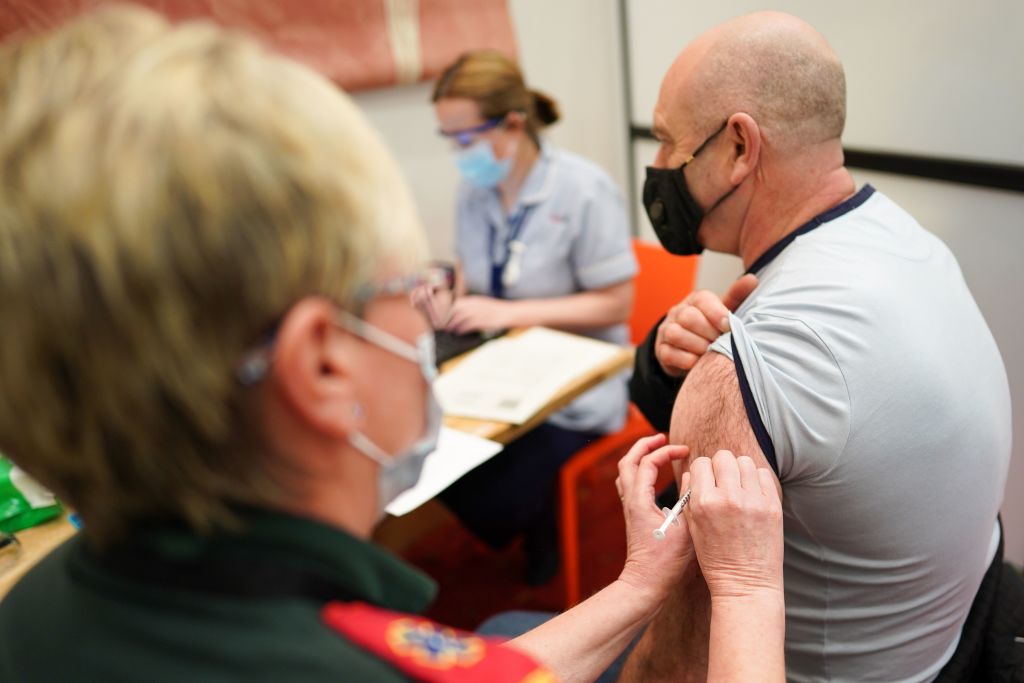
A key worker from Sunderland receives the Pfizer BioNTech Covid-19 vaccine at the Life Science Centre at the International Centre for Life in Newcastle upon Tyne, northeast England, on January 9. Photo by IAN FORSYTH/POOL/AFP via Getty Images
Around 2 million people in total have been vaccinated against coronavirus in the UK, Health Secretary Matt Hancock said Sunday. His words came on the same day England’s Chief Medical Officer warned the “situation has deteriorated further” since Monday, when the national alert level was raised to the highest level for the first time.
Speaking to Sky News on Sunday, Hancock said the health service administered more doses over the last seven days than in the whole of December. Exact figures will be published on Monday, but he said the country was “on course” to inoculate 200,000 people per day.
“We’ve now vaccinated around a third of the over-80s in this country,” he added, saying the “most vulnerable” will be vaccinated by the “middle of February.”
Health service faces breaking point: Hancock's comments came as Chief Medical Officer Chris Whitty described the rising numbers of cases, deaths, and hospital admissions as “the most dangerous situation anyone can remember” facing the National Health Service in some parts of the country.
Writing in The Sunday Times, Whitty points to the “new, more transmissible variant of this disease,” which “is spreading rapidly across the country and having tragic consequences.”
Both Hancock and Whitty stressed the importance of obeying lockdown restrictions.
Every offence can be fatal,” Hancock said, “these rules are not there as boundaries to be pushed; they are the minimum of what you should do.”
“As far as we can tell, the vast majority are obeying the rules,” he added.
All adults to be vaccinated by fall: Speaking to Andrew Marr on the BBC on Sunday, Hancock also said every adult will be offered a Covid-19 vaccine by the fall. This will be "according to need," with the most vulnerable offered a vaccine first.
Stressing the number of doses on order, Hancock said: "We are going to have enough to be able offer a vaccine to everyone over the age of 18, and by the autumn. I really hope that everybody will take that up."
Grim case count: The UK has become the first country in western Europe to report more than 3 million coronavirus cases, according to data from Johns Hopkins University, and some 81,000 people have died.
On Saturday, the UK recorded a further 59,937 Covid related cases, and 1,035 deaths.
An earlier version of this post misstated the period that vaccinations took place. To date, a total of around 2 million people have been inoculated in the UK.
From CNN's Beijing Bureau
The World Health Organization team investigating the origins of the coronavirus pandemic will arrive in China later this week, China's National Health Commission announced on Monday.
"WHO expert group will visit China on January 14 to conduct joint scientific research with Chinese scientists on virus tracing," a statement from the NHC said.
Last week, WHO said that China blocked the arrival of the team of global experts as the necessary permissions to enter the country had not been approved.
WHO Director-General Tedros Adhanom Ghebreyesus said he was "very disappointed," in a rare rebuke of China from the UN agency.
For months, WHO officials had been negotiating with Beijing to allow a team of global scientists access to key sites to investigate the origin of the virus -- first detected in Wuhan in December 2019 -- and its likely jump from an unidentified host species to humans.
In May, WHO agreed to hold an inquiry into the global response to the pandemic after more than 100 countries signed a resolution calling for an independent probe.
CNN has reached out to WHO for comment.
From CNN's Martin Goillandeau

"Covid" is written on a casket containing a deceased person who died from the coronavirus. The coffins stand in the crematorium's worship room before cremation in Saxony, Meissen, Germany, on January 8. Robert Michael/picture alliance/Getty Images
More than 40,000 people have died from symptoms related to the novel coronavirus in Germany, according to data from the country's center for disease control.
The daily tally from the Robert Koch Institute showed an additional 465 deaths in a span of 24 hours, bringing the country's total death toll to 40,343.
The country also recorded 16,946 new infections in the same time frame, bringing total cases to 1,908,527.
Germany, which was praised for its handling of the first wave of the pandemic, reported its largest 24-hour increase in Covid-19 fatalities on Friday. With this, the country’s death toll increased by 1,188 in 24 hours.
Lockdown extended as cases surge: Earlier in the week, the government extended the country's national lockdown -- originally scheduled until January 10 -- until the end of the month, while tightening restrictions on movement and contact to curb the spread of the virus.
Germany pushes ahead with vaccine drive: On Saturday, Health Minister Jens Spahn announced that half a million people across the country had been vaccinated against Covid-19.
Retrieved from: https://edition.cnn.com/world/live-news/coronavirus-pandemic-vaccine-updates-01-11-21/index.html
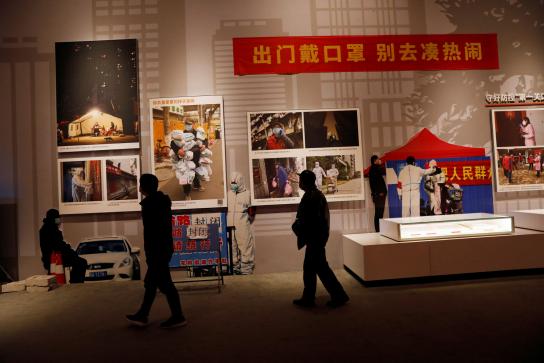
Visitors attend the museum at Wuhan Parlor Convention Center Dec. 31, 2020 in Wuhan, Hubei province, China.Credit...Tingshu Wang/Reuters
At a museum in Wuhan, China, a sprawling exhibition paints a stirring tale of how the city’s sacrifices in a brutal 76-day lockdown led to triumph over the coronavirus and, ultimately, rebirth.
But the exhibition may be most striking for what is not included about the experiences of the city where the virus first came to the world’s attention.
For example, visitors are invited to lay a virtual chrysanthemum at a wall of martyrs that includes Li Wenliang, the ophthalmologist at a Wuhan hospital whose death from the virus led to nationwide mourning. But missing from his brief biography is a crucial fact: that Dr. Li was reprimanded by the government for warning colleagues about the virus.
China has spent much of the past year trying to spin a narrative of the coronavirus pandemic as an undisputed victory led by the ruling Communist Party. As life in the city, and most of the country, has returned to normal, the state-run news media has largely ignored the government’s missteps. Instead, the media cites China’s response as proof of the superiority of the country’s authoritarian system, especially compared with that of the United States and other democracies, which are still struggling to contain raging outbreaks
And now, as the Jan. 23 anniversary of Wuhan’s lockdown nears, the government has deployed an army of censors to scrub the internet of critical coverage of the Wuhan outbreak.
A recent propaganda directive explicitly banned coverage of the anniversary of the outbreak, according to journalists at state-run news outlets who were briefed on the order. Instead, propaganda agencies have pushed feel-good videos and adulatory articles that depict Wuhan as a city reborn.
The government underscored its message to the media last month when it sentenced Zhang Zhan, a 37-year-old citizen journalist who documented Wuhan’s ordeal, to four years in prison. She is the first person known to have faced trial for chronicling China’s outbreak.
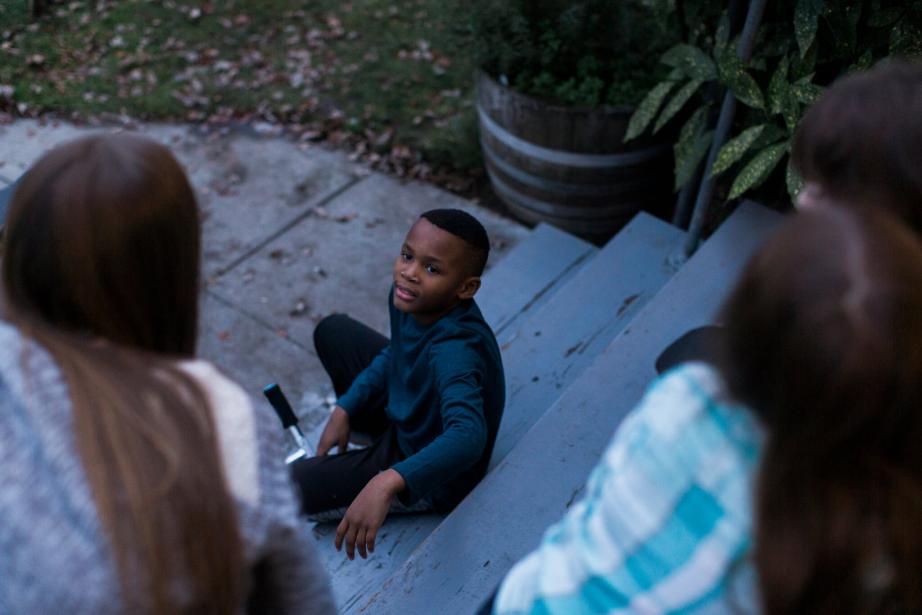
Floyd Scott at home in The Dalles, Ore., where he lives with his adoptive family along with his siblings, Mesha and Jermain.Credit...Michael Hanson for The New York Times
The last step in the long journey to adopt a child through the foster care system is the courtroom finalization. It’s traditionally provided an important opportunity for loved ones to gather and pose for pictures as a judge blesses the creation of a new “forever family” with a smack of the gavel.
But, like so many other things in the Covid-19 era, this tradition has gone virtual. “We finalized our adoption over the phone,” said Celeste Scott, who last May adopted her three youngest children — who were 4, 5 and 6 when they first came to live with her in the spring of 2019. “It was kind of anticlimactic.”
Still, Scott, of The Dalles, Ore., knows she is fortunate to have finalized the adoptions at all. If she lived elsewhere in the country, she could very well still be waiting. The pandemic has created new challenges in the foster care system and worsened old ones — creating delays in placements and adoptions and forcing some older youth to exit the system amid a public health and economic crisis.
“The child welfare system is extremely complex and can vary widely by state, and even by county,” said Celeste Bodner, executive director and founder of FosterClub, an advocacy organization for foster youth. “Each of these systems is navigating the pandemic on its own, meaning the experience of a child in one county can be completely different from the one right next to it.”
Soon after the pandemic took hold, for instance, Florida’s child welfare system began conducting the bulk of the work certifying foster parents and placing children in their homes remotely.
In New York, the system ground to a halt. “For a long while, the courts here were just not doing anything virtually,” said Shantell Lewis, a recruiter with the Wendy’s Wonderful Kids program, which focuses on finding placements for older foster youth, at a Brooklyn nonprofit called MercyFirst. Though New York has more recently allowed work to be conducted virtually, the state has a considerable backlog.
Many child welfare professionals are also concerned about older youth “emancipating” from foster care, when local governments are no longer bound to provide financial assistance. This abrupt transition into adulthood, between 18 and 21 depending on the state, in the very best of times represents a significant challenge for roughly 20,000 young people each year. But today, those aging out of foster care are aging in to a country gripped by an ongoing pandemic and crippled economy.
“When a young person ages out of the system, we have in many ways already failed them,” said Rita Soronen, president and chief executive of the Dave Thomas Foundation for Adoption. “But this is even more true right now — there’s nothing like a crisis to show how truly vulnerable this group of young people are as they transition to adulthood.”
Kim Willsher in Paris
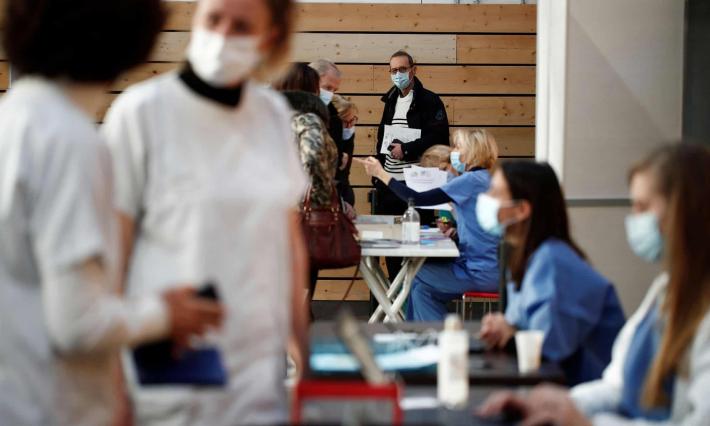
Heathrow airport. Photograph: Ben Fathers/AFP/Getty Images
In France, every child is now obliged to have 11 vaccinations. If parents want their children to attend school, or take part in many extracurricular activities, they must accept. There is no opt-out or concessions made to vaccine doubters.
On Monday France’s government and health authorities are speeding up the country’s Covid-19 vaccine drive – a process complicated by widespread scepticism about the inoculation that has encompassed the usual global conspiracy theories.
For weeks, polls have suggested up to 60% of the French population do not wish to be vaccinated. As the government’s vaccine operation enters its third week, official figures show that as of Saturday at least 93,000 people had been given the jab – a much lower number than elsewhere in Europe, including the UK, Germany and Italy.
Laurent-Henri Vignaud, a science historian whose 2019 book Antivax, co-written with immunology specialist Françoise Salvadori, examines vaccine scepticism in the west since the 18th century, says we should not heed polls suggesting the French will refuse the vaccine.
Advertisement
“There’s a very big difference between what the French say and what they do,” he told the Guardian. “And polls whose methodology and questions can seem abstract do not reflect what happens when people know where they will have the vaccine, what it does, the how, when and why.”
Vaccine doubters have existed as long as vaccines, but for years polls have suggested France has more than most of its European neighbours – an odd reputation given that immunology pioneer Louis Pasteur was French and is a figure of fierce national pride.
Prof Jocelyn Raude, an expert on health behaviour at the Ecole des Hautes Études en Santé Publique who has studied the anti-vaccine movement, says that as recently as 2005 polls showed 90% support for vaccines, “which seems incredible today”.
However, by the turn of the 21st century the seeds of doubt had already been sown.
In the 1990s, a mass campaign to vaccinate French children against hepatitis B coincided with a jump in multiple sclerosis cases, though studies never found a convincing link between the two.
In 1991, there was a medical scandal not linked to vaccines specifically when it was discovered that health authorities had knowingly distributed blood products contaminated with HIV to haemophiliacs in the 1980s. Several ministers were later charged with manslaughter.
However, Raude said it was the 2009 H1N1 scandal, in which the government massively overordered 94m vaccine doses at a cost of €869m (£780m), that fuelled today’s vaccine scepticism.
The health ministry later cancelled more than half the order but the damage was done. Opposition parties criticised the waste of public money and accused officials of being in league with big pharma. In the end, 323 people in France died of H1N1, only 6m people were vaccinated and 19m vaccine doses were destroyed. An official estimate put the cost of the debacle at €382m.
Raude says the scepticism was amplified when some high-profile French celebrities began expressing vaccine doubts, relayed by newly emerging social media networks.
Then came the Mediator scandal. The diabetic drug, widely but wrongly prescribed to those seeking to lose weight, was linked to between 500 and 1,200 deaths over more than three decades.
Mediator’s manufacturer, Servier, was accused of charges including manslaughter, and 12 people ended up in the dock in a criminal trial last year, including officials who were also paid as consultants of pharmaceutical companies. The company and the individuals charged deny wrongdoing. Judgment is expected in March.
“It was a tipping point. The Mediator scandal validated in people’s minds the idea of corruption between officials and pharmaceutical companies in France; that it was about business not health safety,” Raude says.
Another cause, he says, is the lack of confidence in doctors and scientists.
“It’s not new for the French to lack confidence in political leaders, but there is a low level of confidence in the medical authorities in France. The effect of this is if you don’t trust the experts, you don’t follow their advice.”
Vignaud says vaccine scepticism is less against the vaccine itself than those promoting it, reflecting a distrust of “politicians, high-profile doctors and experts and journalists”.
“France doesn’t have any more hard and fast anti-vaxxers than anywhere else, what it does have is … a certain dissatisfaction with the political class,” he says.
“There is a strong expectation of the state, but we are permanently disappointed: we see this with the vaccine programme: some say it’s too slow, others it’s too fast. Everyone is disappointed.”
The film Hold-Up, a much lampooned and debunked epic claiming Covid-19 is a global conspiracy, has compounded the mistrust and been been shared by influential figures.
Among those trying to combat the disinformation with facts and humour is the Facebook site Les Vaxxeuses. “Vaccines are the biggest medical advance … don’t let lies make you doubt the benefits,” the website says.
Over the weekend anti-vaccination proponents were dealt a blow when the far-right leader Marine Le Pen changed course and said she would agree to receive a Covid jab, having previously voiced her opposition.
Ministers are confident France’s vaccine programme will catch up in the coming weeks, insisting it is “a marathon, not a sprint”.
“Once access to the vaccine becomes a reality people will have the vaccine. They have had enough,” Vignaud says.
Raude agrees the government’s “slow steps” strategy appears to be working. “The government has been slow and careful so as not to frighten people … when French people see the benefits, they will do it.”
Retrieved from: https://www.theguardian.com/global/2021/jan/11/vaccine-scepticism-in-france-reflects-dissatisfaction-with-political-class
Here are the key global developments from the last few hours:
· China says WHO Covid-19 origins probe team to arrive 14 January. A World Health Organization team of international experts tasked with investigating the origins of the Covid-19 pandemic will arrive in China on 14 January, China’s national health authority said on Monday. The team was initially aiming to enter China in early January for the investigation but their arrival was delayed due to lack of authorisation from Beijing for their entry.
· Seven mass vaccination sites to open Monday in England. The new centres - including at a football stadium and a tennis club - will be joined later this week by hundreds more GP-led and hospital services along with the first pharmacy-led pilot sites, taking the total to around 1,200, NHS England said. The locations - Ashton Gate in Bristol, Epsom racecourse in Surrey, the Excel Centre where London’s Nightingale hospital is based, Newcastle’s Centre for Life, the Manchester Tennis and Football Centre, Robertson House in Stevenage and Birmingham’s Millennium Point - will offer jabs to people aged 80 and above, along with health and care staff.
· Two mass vaccination locations opened in New York City on Sunday. The mass sites were open for part of the day on Sunday before they start operating round the clock, seven days a week on Monday as part of New York City Mayor Bill de Blasio’s push to set up 250 vaccination locations to meet the ambitious goal of inoculating 1 million New Yorkers by the end of the month. Three other smaller sites also opened on Sunday.
· India is preparing for a mass coronavirus vaccine rollout. India aims to begin vaccinating its 1.3 billion people against coronavirus from Saturday, a colossal and complex task compounded by safety worries, shaky infrastructure and public scepticism. In one of the world’s biggest rollouts, the planet’s second-most populous nation hopes to inoculate 300 million people - equal almost to the entire US population - by July.
· England’s chief medical officer has warned the NHS faces the “most dangerous situation” in living memory as the pandemic causes record deaths and hospital admissions. Chris Whitty has said the only way to prevent avoidable deaths is for the public to stay home wherever possible.
· Mainland China saw its biggest daily increase in Covid-19 cases in more than five months, the country’s national health authority said on Monday, as new infections in Hebei province surrounding Beijing continued to rise. Hebei accounted for 82 of the 85 new local infections reported on 10 January, the National Health Commission (NHC) said in a statement, with Liaoning Province also reporting two new cases and Beijing reporting one new case. The country also saw 18 new imported infections from overseas.
· A county in the northeastern China’s Heilongjiang province on Monday moved into lockdown after reporting new novel coronavirus infections, state television also reported separately.
· Monday marks a year since the first coronavirus death was announced in Wuhan. China announced the first death from a new virus in Wuhan on 11 January 2020. Twelve months later, Covid-19 has claimed 1.9 million lives worldwide.
· Coronavirus infections have now surpassed 90 million confirmed cases around the world, according to Johns Hopkins University, as more countries brace for wider spread of more virulent strains of a disease that has now killed1.9 million people worldwide.
· Mexican president’s spokesman tests positive for coronavirus. The spokesman for Mexican President Andrés Manuel López Obrador said he tested positive for coronavirus on Sunday, the same day the country detected a case of a Covid-19 variant that is spreading in the United Kingdom.
· South Korea reported fewer than 500 new coronavirus infections on Monday for the first time since record high daily case numbers over the Christmas holiday period. The Korea Disease Control and Prevention Agency reported 451 new cases as of midnight on Sunday, driven by a lull in testing as well as an apparent easing in infections. The country reported a record 1,241 cases in one day during the Christmas holiday, the peak of the country’s largest wave of infections yet.
· Headteachers in England forced to ration on-site lockdown learning. Nearly half of England’s headteachers are being forced to prioritise class places among vulnerable students and the children of key workers because of a huge increase in demand, according to a survey of school leaders.
· About 80% of people in Japan are against holding the Tokyo 2020 Olympics this summer, amid a surge in coronavirus cases in the host city and other parts of Japan. A weekend poll by the Kyodo news agency found that 35.3% wanted the Games to be cancelled, while 44.8% favoured another delay. Local organisers and the International Olympic Committee have said that it will not be possible to postpone a second time. The Games, which are due to open on 23 July, were delayed by a yeardue to the Covid pandemic.